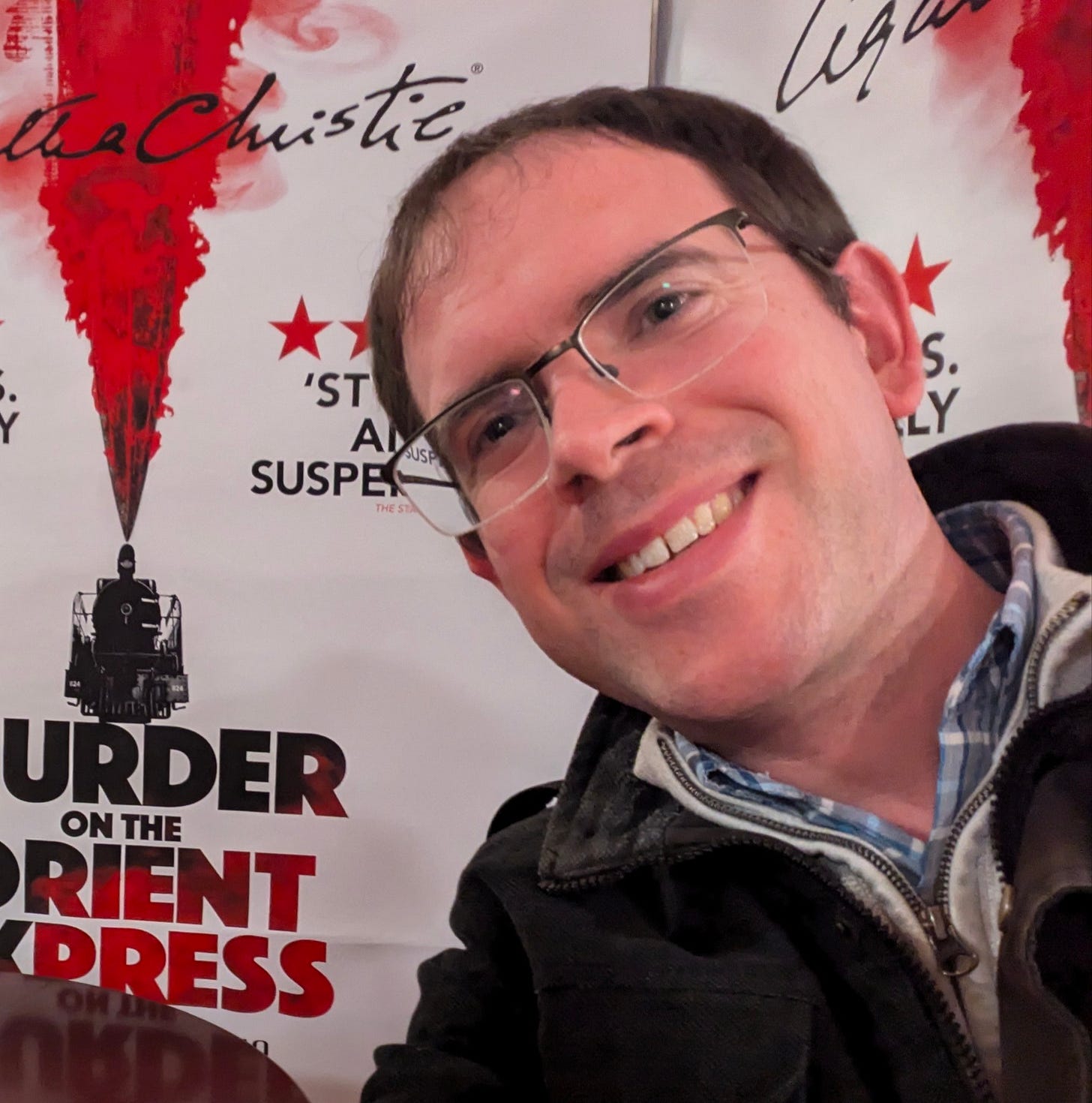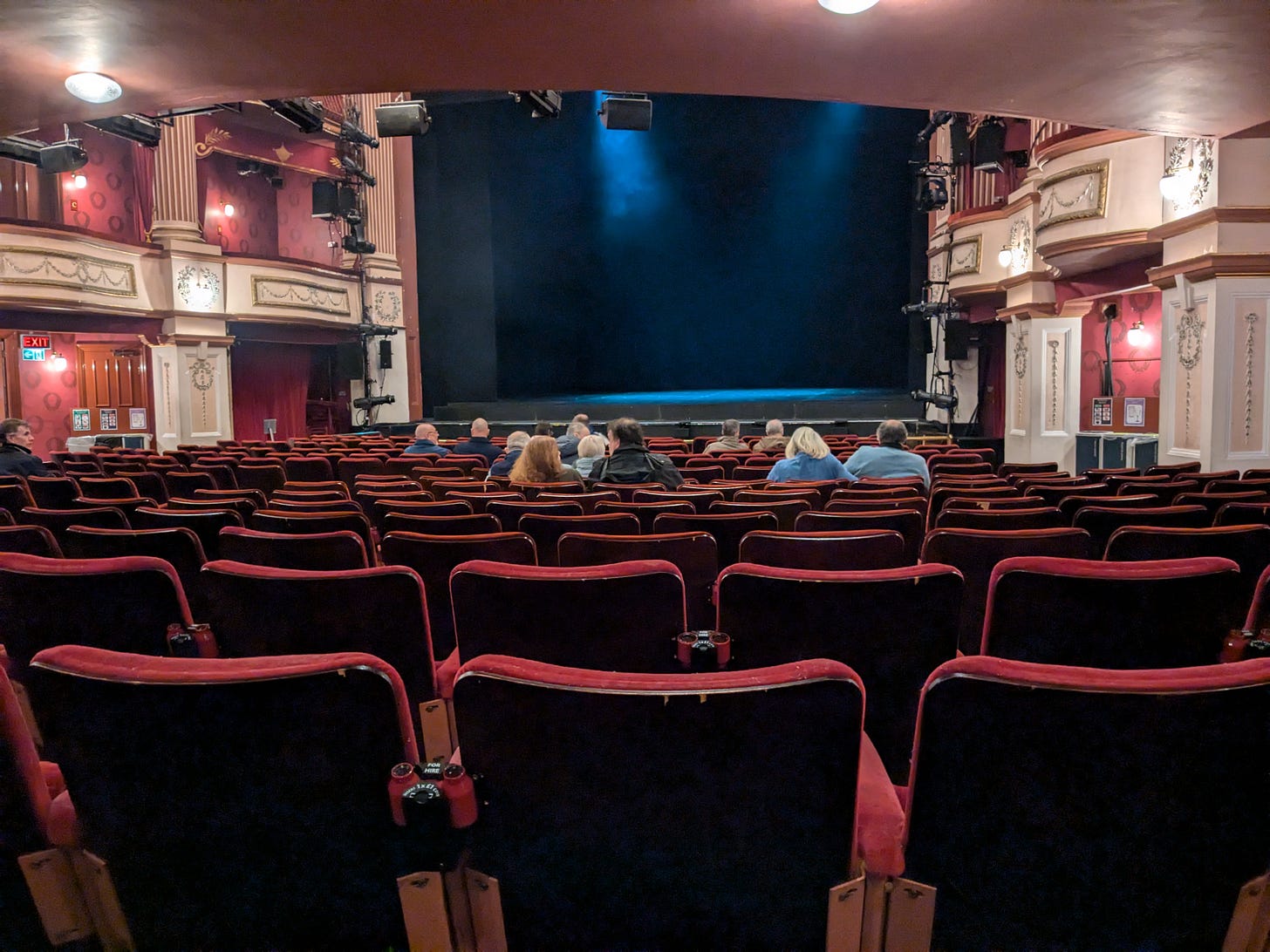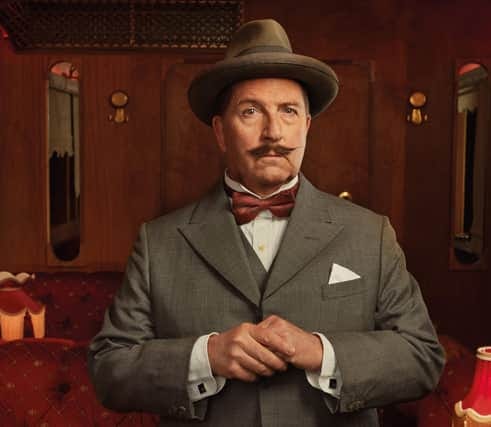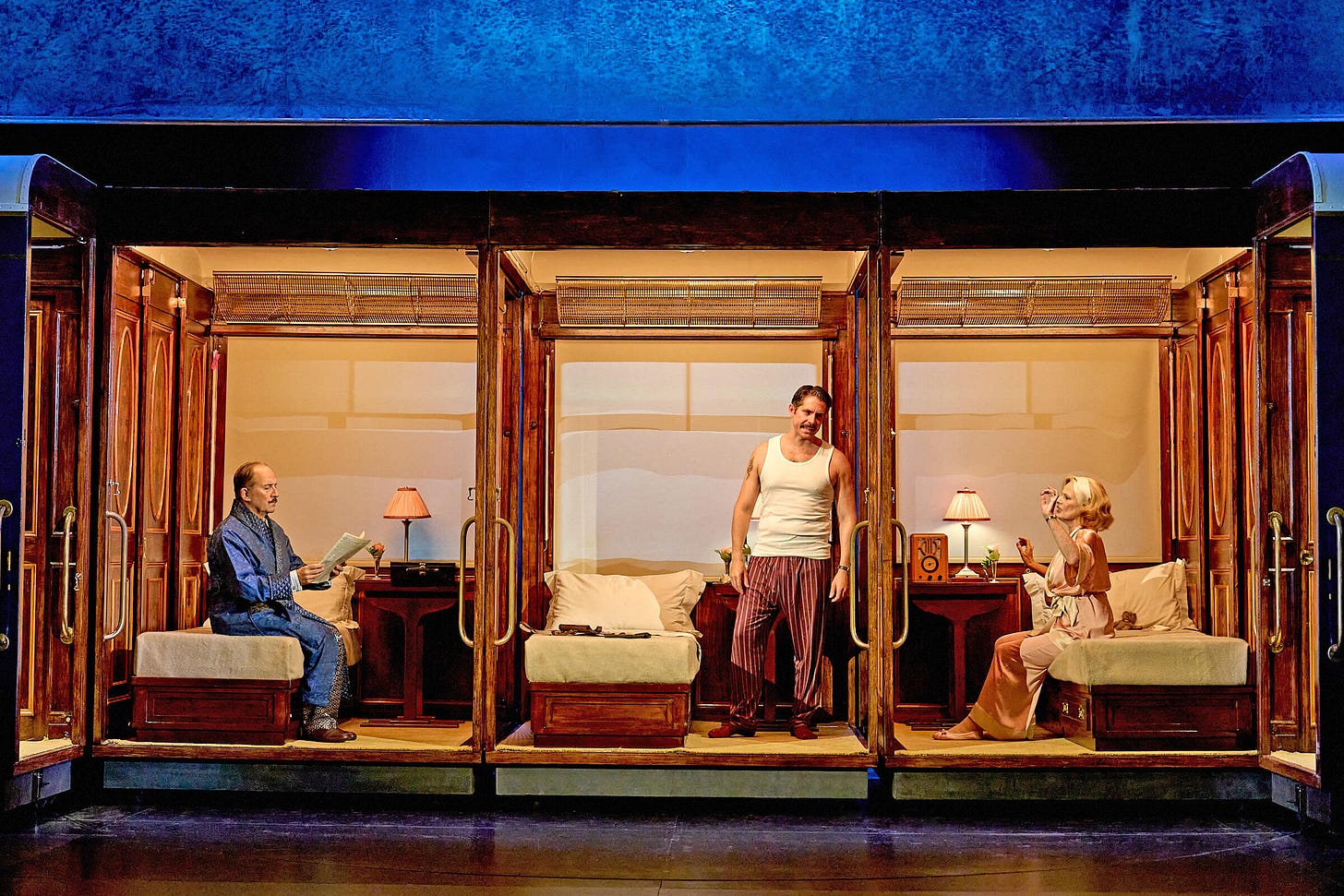On Tuesday, Mrs Manse and I had a rare child-free evening out, to see the touring production of Murder on the Orient Express in Cardiff. This was an early birthday treat, and I thoroughly enjoyed it.1 So, here is my first (but hopefully not last) theatrical review for readers of Murder at the Manse.
Agatha Christie herself had toyed with the idea of creating an Orient Express stage play, but never actually developed this idea.2 The task of adapting it for the stage has fallen instead to American dramatist Ken Ludwig, at the request of Agatha Christie Ltd. Ludwig’s version premiered in New Jersey in 2017, and the UK tour started in September last year. The UK production is directed by Lucy Bailey, whose other credits include the West End staging of Witness for the Prosecution and a touring production of And Then There Were None.
The plot closely follows the original novel. The year is 1934 (the year of the novel’s publication), and an unusually full Orient Express is making its journey from Istanbul. Poirot is a last-minute addition to the passenger list, invited as a special guest of the railway company’s director, Monsieur Bouc. Poirot is in a rush to return to London, but the train’s progress is halted by snow. Even more inconveniently, one of the passengers has been murdered. Inevitably, Poirot ends up investigating the murder, at the insistence of Bouc:
Poirot: “I have to be back in London in three days.”
Bouc: “Then solve it in two!”
There are some significant changes from Christie’s plot, but they don’t alter the overall structure and I don’t think fans of Dame Agatha would object to them. The most obvious one is the reduction of characters, with the cast of suspects reduced to 8, making it a more manageable number for a stage production.3 As a result, some characters’ back stories are changed, or merged with those that didn't make the cut. There is a major new insertion into the plot at the very end of Act 1, although this is not out of place and creates a good moment of suspense around the interval.4 Ken Ludwig has also added a kind of prelude before the action begins, including a monologue from Poirot:
“The story you are about to witness is one of romance and tragedy, primal murder and the urge for revenge… What better way to spend a pleasant evening?” 5
Ken Ludwig’s script ensures a good cast of distinct, eccentric characters. Among the suspects, Helen Hubbard is the strongest character, whose American exuberance provides moments of lightness throughout. Monsieur Bouc serves as a good humorous foil to Poirot, giving the Belgian sleuth a key dialogue partner in the investigation. Michael Maloney’s Poirot is an enjoyable interpretation, with echoes of David Suchet — although arguably, Maloney’s portrayal is too shouty, and his angrily frustrated responses at points felt out of place. The main weakness in the characterisations lay in the accents. I won’t name names, but some of the actors struggled to maintain a single accent across the production, sometimes unintentionally switching nationalities halfway through conversations.
The production has an interestingly varied atmosphere, with sometimes starkly juxtaposed light and dark moments. There is a strong, and enjoyable, stream of humour throughout. Much of this is provided by Hubbard and Bouc, with Princess Dragomiroff also offering several witty replies. There are also regular jokey comments around Poirot’s egotism, and mistaken references to him being French. At the same time, there are some suddenly sinister moments, and very tense scenes. The opening prologue is definitely not cosy. And there is particular tension towards the end, in an excellent scene where (most of) the cast appears in front of the curtain, and we watch Poirot wrestling with an ethical dilemma. This mix of moods worked well, though some of the humour was perhaps overdone.
One other aspect that deserves a lot of praise is Mike Britton’s set design. It’s not easy to create a meaningful train scene on stage, but this production surpassed my expectations. Making use of a turntable and clever construction, the play moved between corridor scenes, cutaways of compartments, views of individual rooms, and a dining carriage. Alongside this, there was clever use of lighting and projection to capture the snowy setting. It was fascinating watching some of the scene changes.
Overall, this was a great production, that can entertain both committed Christie fans and newcomers to her work. I very much enjoyed hearing two theatregoers excitedly discussing who they thought dunnit in the toilet queue in the interval, clearly ignorant of the actual solution. They were very wrong in their guess! This touring production only has a few more months left to run, but if you miss it, I have some good news for you. Ken Ludwig’s Death on the Nile, with the same director and production team, will be touring the UK from September. I’m definitely hoping to see it.
Verdict: ⭐ ⭐ ⭐ ⭐ ⭐ (5/5)
To find out more about these productions, visit the official websites at:
My birthday isn't until Monday, but you're still welcome to wish me a happy birthday in the comments section.
Mark Aldridge, Agatha Christie's Poirot: The Greatest Detective in the World (HarperCollins, 2020), 429.
If you’re interested, alongside Poirot, Bouc and the victim, you have the conductor Michel, Countess Elena Andrenyi (whose husband is not able to travel), Princess Dragomiroff, Greta Ohlsson (who is now a temporary companion to Dragomiroff), Helen (not Caroline) Hubbard, Hector MacQueen, an unnamed Colonel, and Mary Debenham.
With thanks to my friend Stefan for reminding me afterwards that this moment wasn’t in the original book.
I’m not quoting this from memory — my memory is not that good! This monologue is quoted in Mark Aldridge’s book on page 430.









Just arrived home from the final Bath performance. As you mentioned the staging was phenomenally well executed. I think I would agree about the characterisation of Poirot himself straying a little bit from the Christie source material. It bothered me a little that Poirot perhaps wasn’t vain enough - the great man would never need to introduce himself to the audience, he would assume we all knew who he was already! I also wondered whether recent adaptations of MotOE are putting much more emphasis on Poirot’s dilemma at the denouement (I’m looking at you Ken Branagh). I would say that Poirot in the books is often quite content for justice to be done one way or another. Indeed he is the one who offers the ‘alternative’ solution to Bouc.
Overall a thoroughly enjoyable production - I’m looking forward to Death of the Nile!
(Are you planning on doing a review of Toward Zero?)
Happy (early) birthday! What a fun night out. The set design looks stunning. So cool!